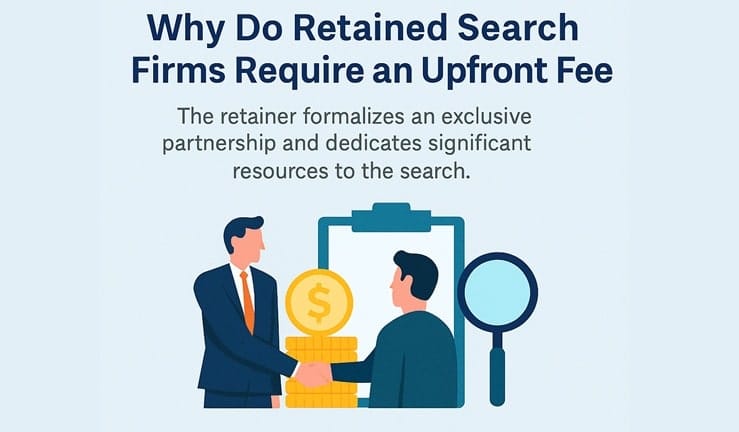When companies seek to fill critical executive positions, they often turn to retained search firms—specialized recruiters who operate under an exclusive agreement. One of the most common questions from hiring managers is: Why is there an upfront fee? And what does a retainer fee cover in executive search?

The Purpose of an Executive Search Retainer Fee
The purpose of an executive search retainer fee is to secure the search firm’s full commitment and undivided attention. Unlike contingency recruiters, who compete against others and get paid only upon a successful placement, retained firms are engaged exclusively. The retainer signals mutual commitment: the client agrees to fund the process, and the firm promises to deliver top-tier candidates through a strategic and customized approach.
What the Retainer Fee Covers
So, what does a retainer fee cover in executive search? It typically includes in-depth market research, candidate sourcing, outreach to passive talent, multiple rounds of screening, and managing the interview process. These upfront tasks require significant time and skilled resources. The fee ensures the firm can deploy its senior consultants and researchers without waiting for a success-based payout.
Upfront Fee vs Success Fee in Recruitment
In retained search, payment is usually made in stages—starting with an upfront fee, then additional installments as the search progresses. This upfront fee vs success fee recruitment model allows firms to invest in quality at each stage rather than rushing to close a deal. The final installment is often tied to candidate placement, aligning interests while maintaining service quality throughout.
Is a Retained Search Fee Refundable?
A common question is: Is a retained search fee refundable? Typically, no. Because the firm invests time and resources immediately after engagement, the fee compensates for that effort, regardless of outcome. However, many firms offer guarantees—such as conducting a new search at no additional cost if a placed candidate leaves within a set period.
What Happens if a Retained Search Fails?
Clients may also wonder, what happens if a retained search fails? In such cases, reputable firms usually have a replacement policy, committing to continue the search until a successful placement is made. The non-refundable nature of the retainer protects the firm’s risk, while the guarantee protects the client’s investment.
Final Thoughts
Retained executive search is not just about filling a role—it’s about securing leadership that will shape the company’s future. The retainer fee reflects the seriousness, depth, and exclusivity of that commitment. While not refundable, it ensures both parties are aligned in their dedication to a successful outcome.
Want to understand how this fee structure compares in practice? Explore our full breakdown:
👉 Retained Search vs. Contingency: Which Is Right for Your Executive Hire?

